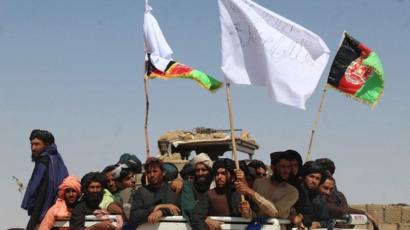The Taliban’s latest gesture of “scaling down” military operations by declaring a temporary seven to 10 day truce is believed to be the most significant development in the 18-month negotiations between representatives of the militia’s Qatar-based office and the United States.
Quoting unnamed Taliban officials, several international media outlets reported last week that the Taliban may announce a temporary ceasefire. Taliban spokesman Sohail Shaheen later told Pakistan’s Dawn newspaper that the militants “have agreed to scale down military operations in days leading up to the signing of the peace agreement with the United States.”
Although there is no comment from the U.S. Special Representative for Afghanistan Reconciliation Zalmay Khalilzad so far, the flurry of diplomatic visits encompassing the United States, Kabul, Islamabad, and Doha over the past few weeks signify that a temporary arrangement to put an end to the 18-year Taliban war is in the offing.
The temporary ceasefire, if agreed upon, may provide a new lease on life to the on-again, off-again peace talks. A more permanent agreement, however, faces a number of pitfalls that could scuttle the ultimate objective of bringing lasting peace to Afghanistan.
In the first place, and to the detriment of the expected peace agreement, the result of Afghanistan’s September 28, 2019 presidential election is still pending. President Ashraf Ghani’s partner in the National Unity Government, Dr. Abdullah Abdullah, who was also his key rival in last year’s poll, raised questions about the preliminary results bringing a narrow victory for Ghani.
The Taliban worldview is another major factor causing fear and concern among Afghans. Observers believe that, despite being staying in castle-like houses and sitting across from suited diplomats in five-star luxury hotels, there is not much change in the Taliban’s views about women, human rights, freedom of expression, etc.
In a recent interview with PBS Frontline, when asked about women’s rights, Taliban chief negotiator Mullah Abdul Ghani Baradar said: “There has been no change in the Taliban in this regard. We accept all the rights that God has granted to women under Islamic law, if they want to live and work, of course we will allow them.”
The Taliban’s internal dilemma, should they forge a peace agreement without fully implementing their ideals, is an equally serious challenge for a group that recruited and brainwashed their foot soldiers in the name of an Islamic utopia. Persuading the rank-and-file to accept something less than what had been promised will be a daunting challenge.
Besides, disarming the Taliban will be a hurdle. The Taliban leadership would be wary about how to rearm their soldiers if the post-withdrawal talks for a comprehensive peace deal with the Afghan leadership do not make headway.
For the Afghan government, on the other hand, trusting the Taliban leadership with a parallel army at their beck and call will be difficult. One must not ignore the reality that the world recognizes the Taliban’s right to be partners in the Kabul government nearly 18 years after their ouster not because of some bigger change in their composition or policy. Rather, it is because of their violence and military might.
Regional and international aspects, rather than local factors, have contributed the most to the continuation of the Afghan conflict. After a US-Taliban agreement, Afghanistan may run the risk of becoming a chessboard for its bigger and more powerful neighbors without solid guarantees of noninterference. This has happened before and may happen again if the United States withdraws its forces without ensuring solid guarantees from Pakistan, India, and Iran not to interfere in Afghan affairs.
Apart from widespread concerns about security situation, the post-Taliban Afghanistan has made progress. Indicators show advances in the areas of human and women’s rights, education, awareness among the people, infrastructure, life expectancy, poverty reduction, health, and to some extent the economy.
Disagreement among the Afghan leadership in a post-withdrawal Afghanistan will not only spoil these hard-earned gains, but also push the country into another conflict.
To avoid such a conflict, the United States and the international community need to make sure the Taliban do not revert to violence once they sit for peace talks with the Afghan leadership. Talks should be the only means to finding a lasting solution, even if the process continues for a longer time than expected.
Secondly, the Afghan government should be given its due place in the intra-Afghan dialogue (between the Taliban and the rest of the Afghan leadership). Any effort on part of the Taliban to undermine the government authority may create problems and devalue the whole process.
Regional actors — Pakistan, Iran, and India, in particular — must not be provided an excuse to influence the intra-Afghan peace talks by picking sides and supporting or opposing one or another group or faction.













